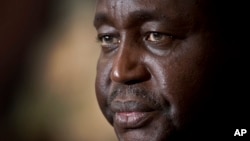Central African Republic's former President Francois Bozize, forced into exile two years ago, was not on the list of eligible candidates for this month's elections, having said in August that he would return to stand.
The polls were set for Oct. 18 but postponed until Dec. 27 after violence in the capital Bangui that has killed about 100 people since September. One person was killed on the outskirts of a Muslim enclave shortly after the Pope's visit last month and eight killed in a camp for displaced people in the country's center.
The president of the constitutional court, Zacharie Ndoumba, included Bozize on the list of rejected candidates. But state media said he had not registered.
A spokesman for Bozize's Kwa Na Kwa party said the court had told them Bozize had not furnished proof of enrollment for the electoral list.
Central African Republic was mired in violence after Bozize fled to Cameroon in 2013 when Seleka fighters seized power in the majority-Christian nation, sparking reprisals by "anti-balaka" Christian militias loyal to Bozize. He was accused of stoking the attacks.
The government that succeeded him issued an international arrest warrant against him in 2013 for crimes against humanity and incitement to genocide during his 10 years in power. He also faces U.N. travel and banking sanctions.
"We deplore the deleterious climate in which the constitutional court has worked," said Kwa Na Kwa party spokesman Christian Guenebem. "This decision is the result of internal and external pressure."
In the streets of Bangui, dozens of pro-Bozize protesters gathered around key intersections to erect barricades. Some threw rocks and fired guns in the air.
The embassy of former colonial power France told its citizens to avoid unnecessary outings.
Of 42 submissions validated by the constitutional court, 30 candidates were approved to stand, most as independents.
"[This saga] shouldn't end with him [Bozize] being excluded from the list," said Human Rights Watch researcher Lewis Mudge. "It should end with an investigation done for crimes he may have committed ... and groups he may have supported."





